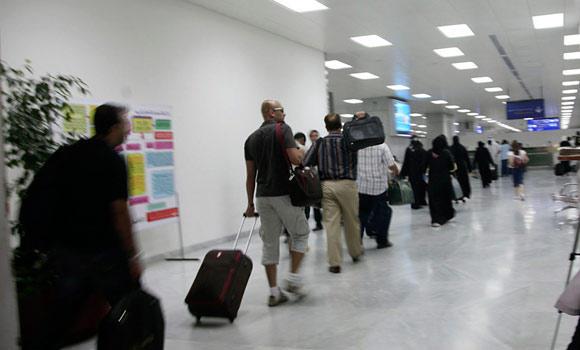
Jeddah, Mar 24: At least 2 million expatriates may lose their jobs or leave the Kingdom shortly as about 250,000 small and medium enterprises will be listed in the Red category of the Labor Ministry’s Nitaqat system on Wednesday.
“About 250,000 trade, industrial and service firms have been given warning that their work permits would not be renewed because they have so far failed to employ at least one Saudi,” Al-Yaum reported yesterday quoting a high-level Labor Ministry source.
The deadline given to these SMEs to correct their situation ends Wednesday. The ministry had asked these firms to employ at least one Saudi to change their status and receive the ministry’s various services.
The source said the ministry would not renew work permits of employees in Red category firms and as a result their iqamas would not be renewed. According to a new law passed by the Cabinet, such iqama violators will be arrested and deported by the Interior Ministry.
The source said the ministry would provide regional governorates a list of SMEs that have so far failed to employ Saudis to take punitive action.
About a month ago, there were 340,000 firms without even a single Saudi working there. These firms have been given a deadline to correct their situation by March 27.
Saudi Arabia has deported more than 200,000 foreigners staying illegally in the country in four months, Passport Department officials said. The deportees included people who were smuggled into the country and expatriates who did not regularize their stay or were not allowed to renew their resident permits.
A majority of 250,000 firms in the Kingdom are involved in illegal cover-up businesses. The new law passed by the Cabinet targets such businesses and those involved in such activities would be punished.
“What is happening in Saudi Arabia now is a cleaning operation,” said Usman Irumpuzhi, an Indian journalist based in Jeddah. “This is a move against illegal workers and businesses, not against expatriates. The companies in the Premium and Green categories are still allowed to recruit foreign workers,” he told Arab News.
He said many Indians have already left the Kingdom on exit only visas because of the new regulations. “According to some sources, at least 100 Indians are leaving Jeddah every day on exit-only visas. This will definitely create a shortage in the number of workers and prices of goods and services will go up,” he added.






Comments
Add new comment